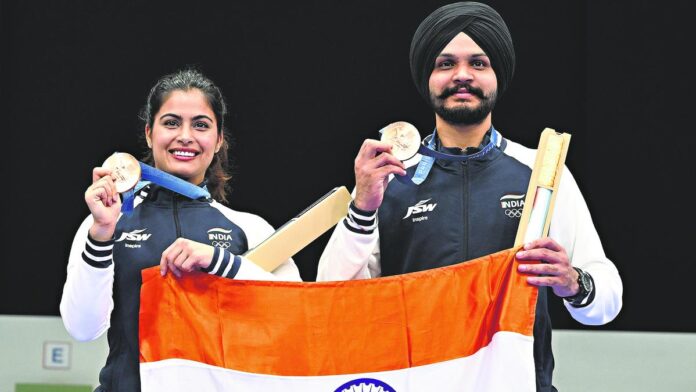
Manu Bhaker and Sarabjot Singh display their medals and the Indian flag after winning bronze in the 10m air pistol mix doubles team event at the Paris Olympic 2024 in Chateauroux shooting range on July 30 2024
| Photo Credit: Ritu Raj Konwar
Manu Bhaker will go into Indian sporting legend as the first multiple medallist at an Olympic Games — winning a bronze medal in the 10m air pistol mixed team event on Tuesday, and the history books will also read that her accomplishment would not have been possible without a stellar supporting hand from her teammate Sarabjot Singh.
About 15 minutes into the bronze medal match at Chateauroux on Tuesday, Indian coach Munkhbayor Dorjsuren called a timeout.
Also Read: Paris Olympics day 5 LIVE updates
In a few minutes’ time, Manu would be standing on the podium alongside her teammate Sarabjot, having beaten South Korea 16-10. She would have a shiny bronze medal around her neck — her second of the Games. She would be clicking a selfie with the gold and silver medal winner and with her place in history secure. But in this timeout, she was standing to the left of the firing line trying to disguise as best she could just how bad things had gone: the digital scoreboard beamed 8.3 which was the poorest the 22-year-old had shot in her entire tournament thus far.
Mixed team events are conducted in a points format. A pair of shooters from each team takes one shot each — two points are awarded to the team that has the higher total score. The first to 16 points wins.
On Tuesday morning at the finals range at Chateauroux, she was not just keeping India in the contest but well in front of a Korean pair that also included Oh Ye Jin, who had just won the women’s individual title with a world record two days back.
Brilliant start
After seven series, Manu had scored higher than Sarabjot in five and equal to him in the sixth. Largely thanks to her efforts, India had won five series to South Korea’s two — leading 10 to 4.
While Manu was coming into the final, brimming with the confidence of having already won a medal, Sarabjot had missed out on making the final of his individual event by the barest of margins.
But just when it looked that the Indians were going to coast to victory courtesy Manu, she slipped as badly as she could have, prompting the timeout. It was now Sarabjot’s time to shine and shine he did.
He shot a 10.5 in his very next attempt — his highest score of the match. It propped up Manu’s score of 10.0 — her second lowest of the competition so far and extended the lead over the Koreans. The Indians won the next series to open up a 14-6 lead before the Koreans closed the gap to make it 14-10.
Manu had another bad shot — shooting a 9.4. It should have been enough at most times to leave an opening for the Koreans to push through. But they produced a bad series as well. All it needed was for Sarabjot to have another poor shot — on his scoresheet that seemed littered with them. But when it mattered most, he stepped up and shot a 10.2. It’s not his best score but it’s more than enough.
While he might have made the decisive blow, Sarabjot won’t take credit for the win.
He will say how the match is a blur but how grateful he was that he and Manu had done enough. “I don’t remember much of the match but I remember we both did what we needed to do,” he says.
Unusual pairing
When you considered who was on the rest of the podium at the conclusion of the event, it had to be admitted that Manu and Sarabjot made for an unusual pairing. Although they are both 22, they admitted that they barely spoke to each other before the bronze medal contest.
And unlike most people of their generation, Sarabjot said that they don’t follow each other on social media.
Also read: Malleswari to Bhaker: Eight Indian women and their ten Olympic medals
But, as unlikely as their partnership was, there was no denying that it was successful one. In his autobiography, A shot at glory, Abhinav Bindra wrote of the uniqueness of shooters.
“You feel a different pressure as you are shooting for someone else in a team event… yet you feel the power of your partner’s reassurance should you falter.”
While Bindra was describing his association with Gagan Narang at the 2006 Melbourne Commonwealth Games, he might as well have been been describing Manu and Sarabjot’s partnership at Chateauroux.
It was Manu who carried the confidence of having won an Olympic medal in the 10m air pistol individual event and shouldered the responsibility of guiding Sarabjot, who had missed out on a place in the final of the individual event a couple of days ago.
Competing against a Korean team that featured an Olympic gold medallist in the women’s (Oh Ye Jin), Manu almost single-handedly powered the team — top scoring in four out of the five series In dia won as it went 10-4 up.
Raising the game
Towards the end when Manu started to feel nervous, it was Sarabjot who raised his game.
In the last three series, it was the latter who scored more in two, providing the final touch with a 10.2, as India clinched the bronze.
“We don’t talk a lot but when we had to work together we did exactly what we needed to,” said Sarabjot.

